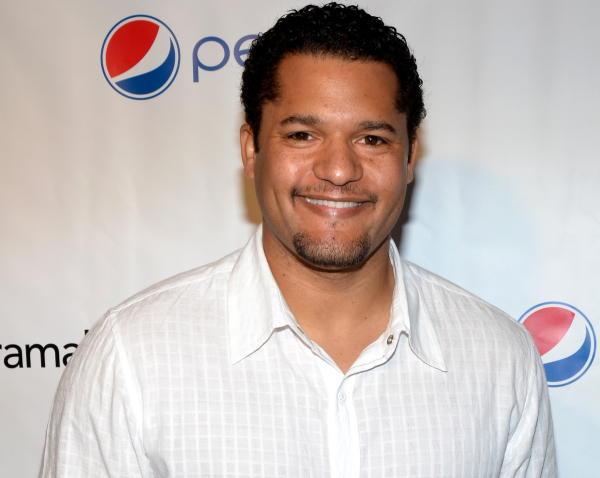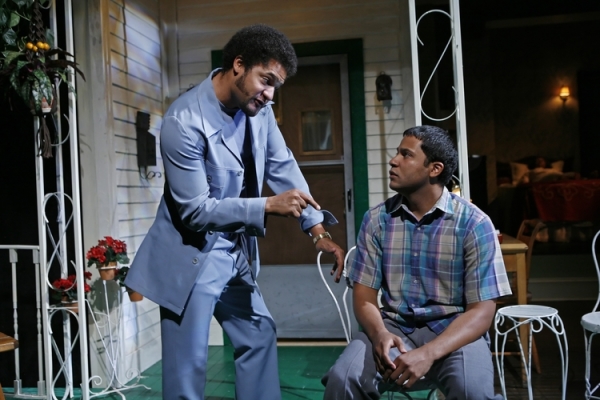Brandon Dirden Ain't Singin' the Blues in Your Blues Ain't Sweet Like Mine
Seven years after launching the Broadway regular’s New York career, Dirden reunites with Ruben Santiago-Hudson at Two River Theater.
The theater has always been a family affair for Brandon Dirden. Since 2007, he's been traversing New York's Broadway and off-Broadway stages alongside his equally talented brother, Jason, and wife, Crystal A. Dickinson. Last year, while he was taking on the iconic role of Dr. Martin Luther King Jr. in Broadway's Tony-winning All the Way, Jason was just a few blocks away in the Tony-winning revival of A Raisin in the Sun. This season, while Brandon took on what he endearingly calls "daddy duty" with his 1-year-old son, Dickinson went into the Broadway revival of You Can't Take It With You.
They have each settled into their individual New York niches, but Brandon still recalls how Tony Award winner Ruben Santiago-Hudson gave the hardworking trio a collective jump start — directing all three in a 2008 off-Broadway production of The First Breeze of Summer. Reunited with the actor, director, and playwright at Two River Theater (sans brother and wife), Brandon is now giving life to Zeke, the explosive African-American protagonist in Santiago-Hudson's world-premiere play, Your Blues Ain't Sweet Like Mine — a drama that delves into America's contentious race debate in the middle of an Upper West Side dinner party. As Dirden describes, it's a sour legacy to live out onstage, but the collaborative journey has been sweet.

(© David Gordon)
How have you enjoyed working with Ruben again?
Every room that he directs, he creates a family — immediately. It's never just a job for him. I think that spirit has really served me well and my wife and my brother, while we all continue to hopefully thrive in this business. Ruben cast [all three of] us in one of our first plays here. That kind of galvanized our trajectory here.
How did you all meet Ruben?
My brother Jason was doing a project called the August Wilson Twentieth Century Cycle at Kennedy Center in D.C., and Ruben was an actor in that company. Ruben had just started directing more and more, and he had a play [The First Breeze of Summer]. Ruben thought Jason would be right for [it]. So Jason goes home and reads the play and he sees the play has brothers in it. So Jason goes back to Ruben he says, "Man, I got a brother. He'd be perfect." So he's like, "Oh all right, I'll give him an audition." Jason and I prepared a scene from the play and auditioned, and that day, Ruben called and was like, "Listen, don't take any other jobs." Nobody knew us in New York. We basically just showed up. Like, what other job am I gonna take today? [laughs] Then I read the play, and my character had a girlfriend, so I said, "Hey Ruben, I got a wife. She's a great actress." He's like "Nah man, I already got some offers out for that role, but if they don't come through I'll give her an audition." So she goes in and auditions and [Ruben says], "All right, yeah, you all are in." I'll never forget, the first day of rehearsal. It was really like the first day of school. Leslie Uggams played our grandmother and she said, "It's a good thing they didn't have an acting grandmother. I'd be out of a job." [laughs ]

(© Richard Termine)
How would you describe his voice as a playwright?
I think Ruben has a distinct voice. [This is] a part of America that we've been afraid to look at, because sometimes we don't want to deal with the ugly past that America has. Ruben really takes an unflinching look, but it's not monolithic in looking at just the atrocities. What Ruben gets a chance to do is explore the beauty in what has happened. He has a speech in this play where he says, "Out of our tumultuous journey bursts the most beautiful and passionate expression of art this country's ever seen." Blues and jazz. [Romare] Bearden , Alvin Ailey, and August Wilson. All of that came out of the tumultuous journey of the black man in America.
Why did Ruben make this musical legacy such a prominent theme in the play?
Our stories are kept alive in our music. You're talking about a people who historically were not allowed to read and write. So how do you pass on stories? You hid it in your music. When you take a people and you deny them the God-given right to have the written word, they're gonna find a way to survive. And while other cultures had no other access and no other interest in who we were as a people, they had interest in our music. For a lot of people, that has been their entry into who we are.
What was your first impression of your character?
They don't come along very often. I thought to tackle this character, I'm going to have to use all of myself and then go beyond what I know to discover more of myself and bring that too. Zeke describes himself as a walking outburst. He is a man who we learn over the course of the play has had very high highs and very low lows. When we meet him, he's really trying to find his equilibrium. I thought it was a unique challenge in getting inside the soul of someone who's been severely disappointed and is trying to reclaim his identity with all of his might.
Ruben also makes references to the police violence that's been in the media recently. Did he write that with current events in mind?
This is probably the saddest part. What you're talking about was written fourteen years ago. He started working on this play right after 9/11 and it is embarrassing how much is still relevant. Even though he's done major rewrites, the substance is still the same. He hasn't added any additional themes to reflect the current times. That was all present. It's a sad reflection of how very little progress we've made since then.








